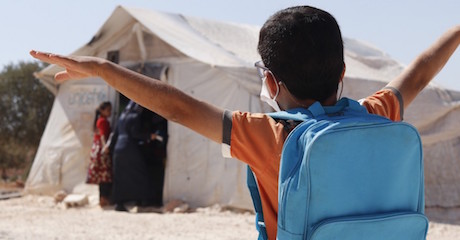Nine-year-old Rafat is a dreamer, a survivor and a portrait of hope and resilience in a nation turned upside down by violence, displacement, attacks on education and other grave violations.
Rafat has learned to navigate life despite his severe visual impairment. The decades-long conflict in Syria has disrupted his learning trajectory and pushed his dreams into the shadows. Displaced from their home several times by the ongoing conflict, Rafat and his family shuttled from displacement center to displacement center, with very limited support for his special needs, For nearly two years, he missed out on the safety, protection, hope and opportunity of an education.
With support from Education Cannot Wait (ECW), the United Nations global fund for education in emergencies and protracted crises, Rafat is back in the classroom. Through a multi-year resilience program delivered in partnership with UNICEF, he is now learning to read and write — and learning to dream again.
Conflict in Syria pushed Rafat, left, and his family out of their home and disrupted his education for nearly two years. Now the family is living in an IDP camp in Idlib, northwest Syria, where the 9-year-old, who is severely vision-impaired, is back in the classroom, with new glasses provided with funding from Education Cannot Wait. © UNICEF/Syria 2021/Dadoul
Education Cannot Wait has helped more than 360K children in Syria get back to learning
Rafat is not alone. There are 2.4 million out-of-school children in Syria today, according to recent reports by UNICEF. With funding from partners like ECW, UNICEF has reached a quarter of all school-aged children in Syria. But the COVID-19 pandemic, economic turmoil, mass displacement, the destruction of schools and other impacts are keeping far too many children out of school, barring them from reaching their full potential.
ECW has funded multiple partners in Syria through its Multi-Year Resilience Program, First Emergency Response and Initial Investment responses in the country. With $48.5 million in funding allocated so far and plans to renew the Fund’s innovative multi-year investment, progress is well underway. More than 360,000 children have already been reached. Close to 290,000 children have received learning materials, 6,000 teachers and administrators have been trained, and over 1,900 classrooms built or rehabilitated. In addition, more than 900,000 children have been reached with COVID-19-related activities, including access to distance learning materials, and health and hygiene awareness and products.
The multi-year program has been operational since February 2020 and supports partners like UNICEF in providing safe access to learning sites, improving quality education through teacher training, implementing inclusive psychosocial support methodologies for girls and monitoring attacks on schools.
Nine-year-old Rafat practices his writing at a learning center supported by UNICEF and Education Cannot Wait. © UNICEF/Syria 2021/Dadoul
A new start for a boy uprooted by war
UNICEF opened the learning center in the Idlib camp for internally displaced people in 2020. At first, Rafat refused to resume his schooling. Imagine what it would be like for a boy who can barely see and barely read, a boy who has been denied his human rights and lived through the trauma and horrors of war, displacement, fear and terror for the majority of his short life? Would school be yet another frightening experience? Would the bullies he faced come back? Would he be living in another nightmare?
With support from his teachers and participation in psychosocial support activities delivered through the program, Rafat is learning that the world is not such a bad place after all. He is making friends and building his confidence. He’s also seeing better. At the learning center, he was referred to an eye doctor, who provided Rafat with a new pair of glasses.
Rafat loves going to class now and looks forward to being successful in his studies.
“When Rafat started attending class, his academic level was low due to dropping out of school for such a long time. Even though he is 9 years old, we had no choice but to enroll him in the beginner level class,” says his teacher, Ali. “I’ve worked hard with him to overcome his vision problem by letting him sit in front of the board, encouraging him to do his best and motivating his classmates to support him.”
Rafat now has a new vision for life and a new vision for his future.
“By attending school, I realized how beneficial education is to my future, and that it will help me succeed in life,” he says. “My teachers taught me to read and write in a way that was easy for me.” Rafat has completed several cycles of non-formal education with support from the ECW-funded program.
My teachers taught me to read and write in a way that was easy for me. — Rafat, 9
“After fleeing our home village, we suffered greatly until we found a safe place to live,” says Rafat’s mother. “We hope that we can return home soon and live in safety. The learning center brings happiness to Rafat — he is now more active and gets high marks at school. My children have struggled so much from displacement; having access to education gives them the ability to have a brighter future.”
Top photo: Nine-year-old Rafat sets off for the learning center in Idlib, northwest Syria, where he resumed his education after a two-year gap when his family was displaced by conflict. The learning center is supported by UNICEF with funding from Education Cannot Wait. © UNICEF/Syria 2021/Dadoul
